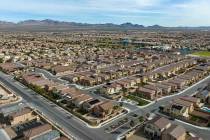Home prices fall again
NEW YORK -- Home prices are dropping in the nation's largest cities and are expected to keep falling next year, as fewer people purchase homes and millions of foreclosures come on to the market.
The Standard & Poor's/Case-Shiller 20-city home price index released Tuesday fell 1.3 percent in October from September.
All cities recorded monthly price declines. The last time that happened was in Feb. 2009.
Atlanta recorded the largest decline. Prices there fell 2.9 percent from a month earlier. Home prices in Washington dropped 0.2 percent in October, the second monthly decline after five straight increases.
Home prices in Dallas; Portland, Ore.; Charlotte, N.C.; Tampa, Fla.; and Denver have fallen for four straight months.
The 20-city index has risen 4.4 percent from their April 2009 bottom. But it remains 29.6 percent below its July 2006 peak.
Las Vegas, Cleveland and Atlanta are almost back to their 2000 index levels at 100.97, 102.20 and 103.30, respectively, in October. Las Vegas is down 0.2 percent from September and down 3.6 percent from a year ago after posting a 0.1 percent increase from August to September.
Las Vegas-based SalesTraq reported a median new-home price of $213,910 in October, up 3.8 percent from a year ago, and a median existing-home price of $113,000, down 5 percent. The new-home median fell to $200,850 in November, while resales climbed to $115,000.
This year is on pace to finish as the worst for home sales in more than a decade. High unemployment and tight credit have kept people from buying homes, despite some of the lowest mortgage rates in decades.
Government tax credits gave the ailing industry a boost this spring. But they expired in April, and in recent months, home prices have begun to dip again.
Millions of foreclosures are forcing home prices down. Many people are holding off on making purchases because they fear the market hasn't bottomed out, analysts say.
Quinn Eddins, director of research for New York-based Radar Logic, said the nation's housing markets are weaker than they appear based on slight declines in the S&P/Case-Shiller index.
"When we say weaker, what we're really saying is it's not just declining slightly," Eddins told the Review-Journal Tuesday. "We saw a decline of 2.7 percent month to month for our 25 markets in September that contrasts to 0.7 percent in Case-Shiller's index, and I expect to see the same when we release our October report next week."
The analyst said he sees more weakness in 2011 because of the huge inventory of bank-owned homes. There's not enough demand to pick up those homes, which typically sell for less than a nondistressed home, keeping downward pressure on prices throughout the year, Eddins said.
Several lenders temporarily halted action after evidence surfaced that some used flawed foreclosure documents to take people's homes. Some banks have resumed foreclosures at a more measured pace.
Also, the number of homeowners who owe more than their house is worth is expected to remain high. They are more likely to default if they run into trouble. Homeowners who have equity can sell their homes if they face a job loss, divorce or illness that makes it impossible for them to pay their mortgage.
And more people might be less inclined to buy now that mortgage rates are rising again. In the last month, rates on fixed mortgages have surged more than a half-point to near 5 percent.
Most experts expect the declines to continue through mid-year with prices on average to lose another 5 percent to 10 percent. The worst price drops will come from cities with a struggling economy and the highest foreclosure rates, while those with better job growth will fare better.























